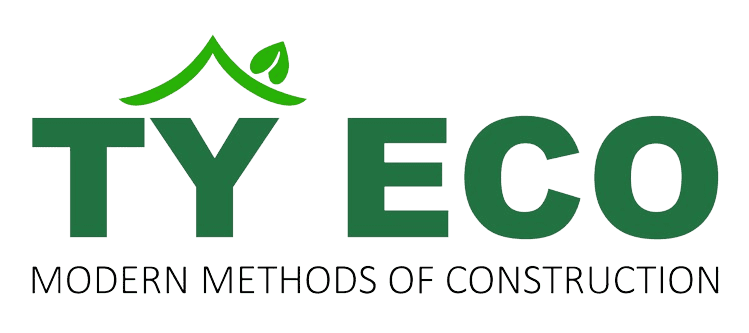Blog
Timber Frame vs Brick: Which is Best for Your Build?
When planning your dream home, one of the earliest, and most important, decisions you’ll make is what to build it from. For generations, brick and block masonry has dominated UK housebuilding, but timber frame construction has grown rapidly in popularity, especially among those seeking sustainable, fast, and energy-efficient builds.
Table of Contents
At Tŷ Eco, we’ve been designing, manufacturing, and supplying bespoke and pre-designed timber frame kits for over 47 years, helping self-builders, architects, and developers across the UK make informed choices. In this guide, we’ll compare timber frame vs brick construction, explore the benefits and drawbacks of each, and answer one of the most common questions we hear: are timber frame houses good?
What Is Timber Frame Construction?
Timber frame construction uses a precisely engineered wooden structure as the load-bearing framework of the home. Wall panels, which are insulated in the factory, are transported to site and assembled quickly, forming the structure in a matter of days.
Our Adra PØ system is an advanced panelised timber frame solution designed to Passive House standards, making it ideal for energy-conscious self-builders. These kits can be bespoke or pre-designed, offering flexibility without compromising performance.
Advantages of Timber Frame Construction
Speed: Faster to build than brick, reducing labour costs and exposure to weather delays.
Energy efficiency: Exceptional insulation and airtightness, especially in Passive House builds.
Sustainability: Uses renewable materials with a lower carbon footprint.
Design flexibility: Easier to adapt for modern, open-plan layouts.
Longevity/Lifespan: If installed correctly, timber frame buildings can stand the test of time.
Disadvantages of Timber Frame Construction:
Upfront design commitment: Most design decisions need to be finalised before factory production, making late changes more difficult.
Moisture sensitivity during build: Frames must be protected from prolonged damp exposure before being sealed, making experienced construction management essential.
What Is Brick (Masonry) Construction?
Brick and block construction, also known as traditional masonry, involves building structural walls from concrete blocks, with a brick outer leaf. This method is durable, well-understood by the construction industry, and has been the UK norm for decades.
Advantages of Brick Construction
Longevity: Can last for centuries with minimal structural issues.
Sound insulation: Dense materials offer good noise reduction.
Thermal mass: Can help regulate internal temperatures in certain climates.
Disadvantages of Timber Frame Construction:
Slower build times: Brick and block walls can take months to complete, especially in poor weather, delaying the project schedule.
Higher labour costs: Longer build times and the need for skilled bricklayers can increase overall costs.
Weather dependency: Construction progress can be heavily affected by rain, frost, or extreme heat.
Lower thermal efficiency without upgrades: Standard masonry walls typically need additional insulation to match the performance of high-spec timber frames.
Timber Frame vs Brick: A Side-by-Side Comparison
Are Timber Frame Houses Good?
Absolutely, and not just for eco-conscious builds. Modern timber frame homes have a proven track record of durability, comfort, and performance. At Tŷ Eco, we’ve seen our systems outperform brick builds in energy efficiency, airtightness, and speed of deliver, without compromising longevity.
Expert insight from John Small at Tŷ Eco:
“A modern, well-built timber frame home can easily last for generations — over 100 years is the norm, and with the right design detailing & maintenance, there’s no reason it can’t stand for centuries, just like the historic timber buildings across the UK and Europe that are still lived in today.”
FAQs
Build Your Timber Frame Home with Tŷ Eco
Choosing between timber frame vs brick ultimately comes down to your priorities: speed, efficiency, and sustainability often point to timber frame, while tradition and thermal mass may lead you toward brick.
At Tŷ Eco, we specialise in bespoke timber frame kits, low-energy systems, and Passive House-standard building solutions, supporting you from initial design to final installation. Whether you’re a self-builder, architect, or developer, we can help you create a home that’s comfortable, efficient, and built to last.





